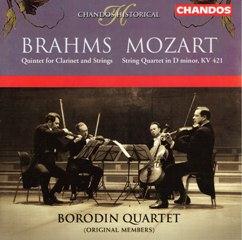Borodin Quartet – Brahms & Mozart (2003)
Borodin Quartet – Brahms & Mozart (2003)

Brahms - Clarinet Quintet in B minor, Op. 115 1 I. Allegro 14:41 2 II. Adagio 12:52 3 III. Andantino - Presto non assai, ma con sentimento 5:08 4 IV. Con moto 9:23 Mozart - String Quartet No. 15 in D minor, K. 421 (K. 417b) 5 I. Allegro moderato 5:17 6 II. Andante 6:25 7 III. Menuetto. Allegretto - Trio 3:47 8 IV. Allegretto ma non troppo - Più allegro 5:12 Ivan Mozgovenko – clarinet (1 - 4) Rostislav Dubinsky – violin Yaroslav Alexandrov – violin Dmitry Shebalin – viola Valentin Berlinsky – cello
When Clara Schumann first heard this quintet, she wrote: "It is a really marvelous work, the wailing clarinet takes hold of one; it is most moving. And what interesting music, deep and full of meaning!" These poignant words by Brahms' closest female friend belie Brahms' disingenuous comparison of the work with his earlier Clarinet Trio: "[It is] a far greater piece of foolishness." From the first movement, the music pulsates with yearning. In its opening measures are the seeds that germinate in the rest of composition, which is equally perfect in its power of evocation and its structural rigor. The autumnal mood of the work results in part from the subtle shifts throughout between the closely related keys of D major and B minor.
Most notable is the second movement Adagio, a tender love song whose wistfulness seems to reflect the entire decline of the late Romantic musical ethos. Of course there is more to this piece than its dreamlike evocations. Listen to the Presto, with its Hungarian folk-dance style and the finale's intriguing variations, the last of which returns full circle to the opening theme of the first movement. "Foolishness" indeed! ---Peter Bates, Rovi
The second quartet in the famous series of six dedicated to Haydn -- and the only mature Mozart string quartet in a minor key -- commands our attention at the outset (Allegro) with the drop of an octave from the first violin that ushers in its plaintive main subject. The contrasting second subject is a songful melody over a throbbing background. Mozart shows how much he learned from Haydn (and Bach) in the development, which features a good deal of contrapuntal passagework. Throughout this movement, harmonies are stretched out before being resolved, increasing the emotional tension. The nocturnal slow movement (Andante), in ABA song form and triple meter, is remarkable for the recurring rising three-note figure in the accompaniment, particularly from the cello, that expands the lovely main melody. In the middle section, this is transmuted into a series of little dissonant stabs of pain. The stately minuet (allegretto) is both elegant and deeply, gravely serious; the middle section, with its dancing first violin over a pizzicato accompaniment, provides the greatest possible contrast. The finale (Allegro ma non troppo) is a set of variations on a theme in a 6/8 siciliano rhythm. The prevailing mood is bittersweet, the harmonies rich, the invention consistently fine. A violin figure that appeared at the start of the movement, resembling the call of a cricket, returns to dominate the coda as the music rises in emotional pitch and then sinks into resigned peace. --- Sol Louis Siegel, Rovi
download (mp3 @320 kbs):
yandex 4shared mega mediafire cloudmailru uplea ge.tt








